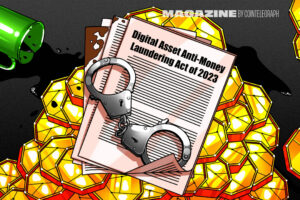
It now costs Bitcoin (BTC) miners at least $17,000 to produce one BTC in the U.S. versus the $5,000-10,000 range a year ago, according to Bitcoin mining data resource Hashrate Index and Luxor.
Bitcoin hashprice has dropped 58% in a year
Unsurprisingly, soaring electricity rates across the U.S. states have contributed to rising Bitcoin mining costs.
Notably, between January 2022 and January 2023, the commercial electricity tariff surged at an average of 10.71% per U.S. state, higher than the average consumer price index surge of 6.4%.
Average industrial rate rise between January 2022 and 2023. Source: EIA/Hashrate Index/Luxor
Coupled with Bitcoin’s downward performance in 2022, which saw a maximum drawdown from around $48,000 to below $15,000, it is evident that active miners generated consistent losses due to the increase in operational costs and lower returns.
But this changed in Q1 of this year as the miners’ hashprice, or the USD price per tera-hash per second per day (TH/s/d), rose 31% thanks to Bitcoin’s price recovery toward $30,000.
“Bleak as the new year looked at the outset, the lowest day for hashprice on a USD basis in Q1 was January 1,” noted researchers at Hashrate Index, adding:
“It was only up from there as a 70% rise resuscitated Bitcoin’s price over the quarter, and along with it, hashprice.”Bitcoin hashprice (in the dollar terms). Source: Hashrate Index/Luxor
Which state is cheapest, most expensive to mine Bitcoin in?
New Mexico emerged as the cheapest and, in turn, more profitable state for Bitcoin miners in Q1 at $16,850 to mint one BTC. On the other hand, Hawaii was the most expensive at around $114,590.
Regionally, the south and the midwestern US states are the most attractive for miners in terms of electricity.
Power cost to produce 1 BTC across U.S. states. Source: EIA/Hashrate Index/Luxor
More recently, some U.S. states, including Arkansas, Montana, Missouri, Mississippi, and others, have take concrete steps to protect crypto miners from excessive taxes and regulations. On the other hand, Texas has amended its utilities and tax codes, bolstering restrictions for crypto mining companies.
Energy deflation could boost miners’ profitability
Furthermore, the researchers anticipate the Bitcoin mining margins to grow further based on the U.S. Energy Information Association’s (EIA) expectations of energy price deflation.
Related: Bitcoin advocates rally at Texas State Capitol to oppose bill cutting mining incentives
For instance, the agency expects the demand for electricity to drop by 1% in Q2, citing additional generation from renewable sources and cheaper natural gas prices. It further anticipates that natural gas prices will remain below $3 in 2023 from 2022’s $6.45 average.
Forecasts for wholesale electricity prices in the U.S. Source: Hashrate Index/Luxor/EIA
Bitcoin mining stocks shine
Lower operational costs could help otherwise cash-strapped Bitcoin mining companies survive in 2023. For example, the stock price of Core Scientific, an already bankrupt Bitcoin mining firm, has jumped over 450% YTD.
Similarly, the HI Crypto Mining Stock Index has soared by more than 100% this year , showing a return of investor appetite for mining socks.
Bitcoin mining stocks performance in 2023. Source: Hashrate Index/Luxor/EIA
Hashrate Index researchers noted:
“If the bitcoin price was to increase by an additional 40% to reach $42k this year, most mining stocks would rise by more than 50% from today’s level, while the four-to-five biggest gainers would soar by more than 150%.”
This article does not contain investment advice or recommendations. Every investment and trading move involves risk, and readers should conduct their own research when making a decision.
















